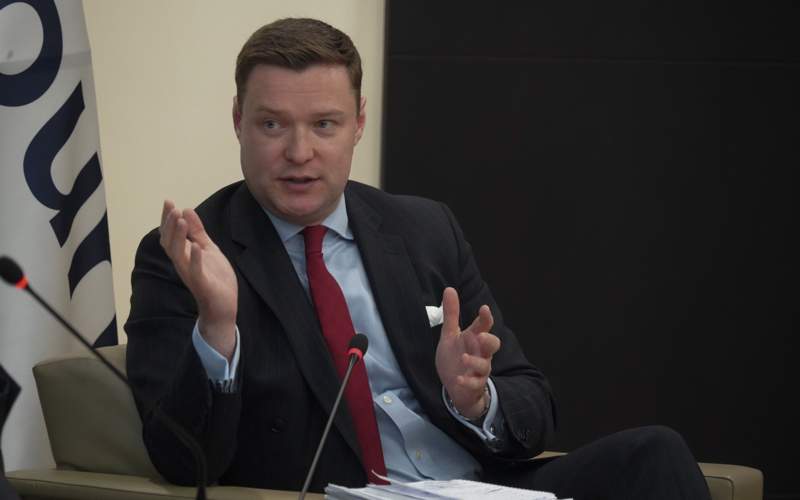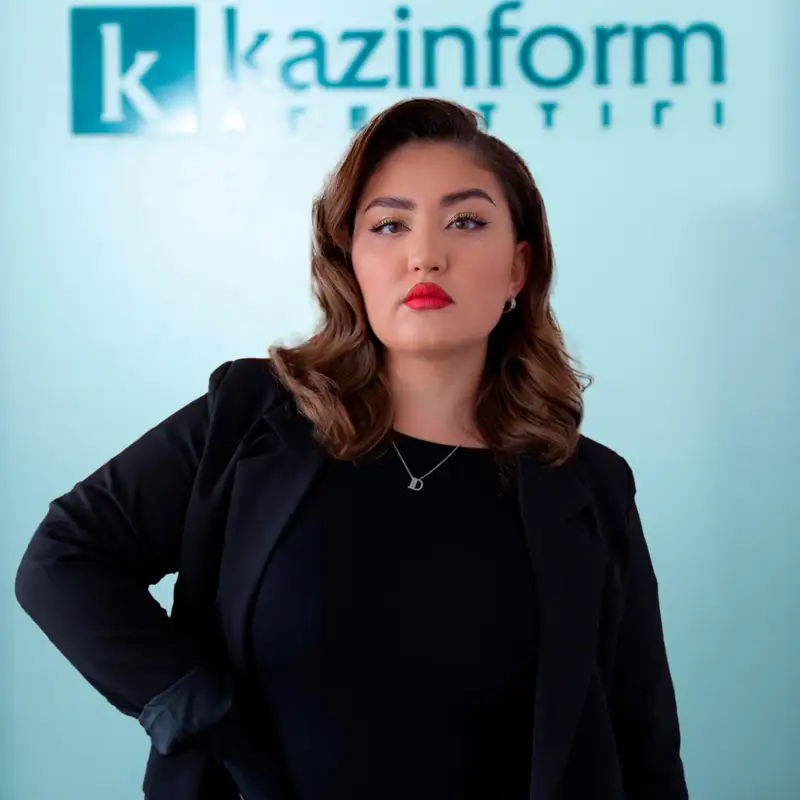Bold legal innovation and 100% satisfaction in over 2,600 settled cases – Exclusive interview with AIFC Court and IAC Registrar Christopher Campbell-Holt
Over 2,600 cases have been settled and enforced by the AIFC Court and IAC since its founding on January 1, 2018, with 100% satisfaction from the parties in dispute. These lawsuits include investors from 28 nations, 618 attorneys registered with it from 30 nations, representing 34 jurisdictions on six continents. In an exclusive interview with Kazinform News Agency correspondent, Mr. Christopher Campbell-Holt, Registrar and Chief Executive of the AIFC Court and IAC, shares details about the Court and its work.

Can you provide some background information on the AIFC Court and its role in the Astana International Financial Centre?
The idea, as led by the President of Kazakhstan, was to provide an absolutely world-class, independent, impartial, international standard court that applies common law procedure but is essentially there for all investors coming to the AIFC, coming from everywhere else in Kazakhstan. And the point was to provide a good reason for trust and confidence by investors, some existing investors from Kazakhstan, from throughout the Eurasia region, and more widely at the global level as well. The thinking behind it all is that if you provide absolutely best-in-class international standard justice and the rule of law, and people believe and trust that it's going to be operating at top international standards, then they trust it, they use it, and they keep coming back to invest more and more money in the economy of Kazakhstan.
By far, the biggest strength of the AIFC Court is its judges. We're led by the Right Honourable Lord Burnett of Maldon, who is the Chief Justice. He was appointed by decree of the President of Kazakhstan, His Excellency President Tokayev, with effect from November 1, 2023. He succeeded Lord Mance, the former Deputy President of the United Kingdom Supreme Court, and before that was The Right Honorable Lord Woolf CH, the Founder, the former Lord Chief Justice of England and Wales Lord Burnett was also, until very recently, Lord Chief Justice of England and Wales. In addition, we have 10 judges. They all happen to be from an English law background. They all have international experience from everywhere, and they're busy. All of the judges have heard a considerable number of cases now and their decisions have been enforced.
What makes the legal framework of the AIFC Court different from that of other national or international courts?
The AIFC took a bold decision to create a second legal system, its geographical territory for the whole of Kazakhstan. If you are a participant, an individual, a company, or some form of entity that registers within the AIFC, the idea was to have an independent AIFC international standard system of law: not just a court and arbitration centre, which is what we provide at the court and arbitration centre, but a legal system that applies principles of international common law modeled on the common law of England and Wales.
Kazakhstan already has a highly developed civil law system and a national system of its own, so why not provide a credible alternative to investors in the form of an international common law system. It provides immediate familiarity, trust, and confidence with investors as a credible alternative to the existing system, so if people want the national system, they can use it. If they want an international system, they can also now use that here.
What are the kinds of cases that go to AIFC Court, and what is its jurisdiction?
The jurisdiction of the Court is for all commercial and civil disputes and not criminal or administrative disputes; we must be careful of that. What is defined as administrative matters in Kazakhstan is quite different from in the West, particularly coming from the English-Welsh legal system, where it tends to be a number of factors, including judicial review, government or local authority or state authority decisions, usually on a limited procedural basis. The types of disputes have been a full spectrum of commercial disputes: everything from banking and finance to increasingly construction disputes, public-private partnerships, where one party in the dispute is usually or is always the government or a government-related entity, and a local, regional, or foreign investor.
The full range of commercial disputes has given us, as a relatively new court, just six and a half years of operations an opportunity to try and properly test all of our systems, our procedures, and in particular our enforcement system, which has been proven to be 100% successful in all cases. It's given us a chance to test how everything works in multiple different scenarios of commercial disputes, which are relevant for investors coming to Kazakhstan. So, we've really been able to build a platform now for really world-class international dispute resolution through the AIFC Court and the IAC.

How does it enforce the AIFC jurisdiction decisions? How is it enforced at an international level?
The AIFC Court is separate from the court system of Kazakhstan, the national court system. We handle everything ourselves in compliance with the law and with the written agreements that we have with the Ministry of Justice and with the National Chamber of Bailiffs. We have a very detailed procedure with escalation procedures and proper supervision by our staff on a day-to-day basis to ensure everything is done properly. And of course, we have full support from the top of the state, from the President of Kazakhstan, and from others in the Kazakhstan state system to ensure this is truly a perfect system for enforcement.
Internationally, the Court has arrangements under existing treaties and government-to-government treaties, particularly in countries in the Eurasia region and, of course, also with countries like China, where a lot of investment is increasingly coming to Kazakhstan and the AIFC. We have understandings with other common law courts as well, not just with countries. We've developed specific recognition of enforcement capacity within the eight other countries in Eurasia where the AIFC Court and IAC have access to their own premises, which we have delivered without any cost whatsoever to the Kazakhstan taxpayer or the government.
Kazakhstan acceded some time ago to the New York Convention, which enables mutual recognition and enforcement of arbitration awards with many countries around the world. This ensures that our Arbitration Centre and arbitration awards, interim and final, can be enforced practically anywhere around the world.
Have there been any notable cases heard by this Court recently?
Every case ends with a judgment or order. They're all available in English, Russian, Kazakh languages, free of charge, 24/7 from the AIFC Court website. And that's very important because we believe strongly in access to justice. In these cases, we've just recently had our first judgment from the new Chief Justice, Lord Burnett of Malden. We have received various cases transferred to the Court and to the IAC from the national courts of Kazakhstan, particularly from the Astana Economic City Court and the Esil District Court. We have had a number of disputes involving the state of Kazakhstan, and the state of Kazakhstan has not been successful in those cases and has paid all Judgment money due.
Really, for me, the broad range of disputes that the Court has already considered is immensely impressive because that's not necessarily the case at other more established international commercial courts, particularly in the Middle East. They tend to specialize in one or two different types of cases; ours has been a full spectrum of increasingly complex commercial disputes.
How does the AIFC Court contribute to commercial law and jurisprudence in Kazakhstan and Central Asia at large?
Our Court’s English judges apply Kazakhstani law from time to time, because in our court, any law can apply, provided the parties in the dispute agree in writing. In most of our cases, it hasn't been AIFC law that's applied; it's actually been Kazakhstani law. We've got a system, which is, I would say, a world first, where we've got English judges who are internationally competent, qualified, experienced, and known for their independence and impartiality in the rule of law application in the strictest regards, applying Russian language and Kazakh civil code. They're actually making progress through their judgments already; they're beginning to make a significant contribution to the development of that law in a civil-law state system.
It's a unique contribution, I think, that the AIFC Court judges are already making in the very limited period of time in which they've been operating at the Court to the development of the law in Kazakhstan. The Court and the IAC have also served as centres of excellence for the wider development of law in Kazakhstan. I personally have sat down face-to-face and assisted the most senior judges of the Supreme Court of Kazakhstan on amendments to the Kazakhstan Civil Procedure Code to provide it with more discretion for judges and more international rule of law standards that we're all familiar with in the West.
We're already pursuing further cooperation. We're independent of the national courts of Kazakhstan and the Supreme Court, but we are close friends on these types of projects of mutual benefit.
How does the Court interact with lawyers, as well as the legal community at large, to promote knowledge sharing and professional development?
The primary focus of the Court and IAC is to deliver justice, to handle cases in the most efficient, cost-effective way, applying the very highest international standards of the rule of law, with unquestionable independence, impartiality, and without doubt complete incorruptibility, and those are the safeguards that all investors want to know, trust, see, believe, and experience when they need to rely upon us to protect their legal rights.
In my view, it’s not good enough to just come to a country like Kazakhstan and set up the infrastructure. You've got to embed what it is you do, your culture, your values, and those international standards into as many people in the Kazakh population and the Eurasia population as possible. So, we've already trained more than 3,500 people in Kazakhstan and the wider Eurasia region in just over six and a half years. We bring trainers from Cambridge University and from University College London in the UK. We've brought the most qualified and most experienced lawyers from big law firms such as White & Case, Herbert Smith Freehills, GRATA International Law Firm, and there are others as well. We've trained on arbitration, mediation, advocacy, and oral and written skills to the highest international standards to equip lawyers in Kazakhstan and the wider Eurasia region to use this Court and IAC to maximum effect for their clients.
We've also engaged with the student communities hugely. This year will be the seventh year of our Court mock trial competition, applying a common law commercial legal problem. In addition, in March we have Eurasia Arbitration Week, which is more about our Arbitration Centre than it is about our Court, which is an arbitration mock or mooting competition. We also have a really top international law firm standard internship program, and we've partnered with an international law firm, LK Law, and some of our best interns. We've had more than 160 young, bright Kazakh lawyers come. We recruit the best of the best from the Kazakhstan law schools and from elsewhere in the Eurasia region; the students come here or do it remotely. We give them a proper structured internship on what it's like to be a case manager. They get to do lots of difficult legal research, they write assignments, they get taught presentation skills, mock trial competition skills, and they get to learn to be a part of a team and learn more soft professional skills as a part of that internship program. So again, that is truly unique anywhere in the world, and I'm very happy that we have provided that now for more than six years for the community.
[Ed. Note]: The AIFC Court and IAC Training statistics from 2018 to 2024 shows a total of 156 internships were completed at the AIFC Court and IAC, with an additional 15 internships completed at LK Law Firm since 2021 and 5 more planned for August 2024. More than 3,500 individuals, comprising students and professionals, received training. Additionally, 54 participants completed the CEDR Mediator Skills Training from 2018 to 2020.
How does this Court deal with problems emanating from cross-border disputes and international law matters?
The AIFC Court applies whatever law the contract of dispute, if there is a contract of dispute, provides. And as I said before in my previous answer, invariably that has been Kazakhstani law. It's highly unlikely in practice that both the AIFC law and the Kazakh law would apply. Elements of them might apply to different aspects of the dispute, but provided that's mentioned clearly, provided clearly in writing in a written agreement such as a contract.
There's the possibility of parallel proceedings, which we've already experienced. But the local courts, the national courts of Kazakhstan, and our Сourt have been enormously respectful of each other. Of course, the AIFC Court is independent. It cannot tell or instruct the national courts of Kazakhstan what to do in its cases. In the same way, the national courts of Kazakhstan and the Supreme Court of Kazakhstan have no jurisdiction or authority to instruct or tell the AIFC Court what to do in its decisions.
We're both independent of each other. But if there are proceedings in the national courts and in our Court at the same time, if this Court decides it has jurisdiction, then it can order the case party or parties to stop the proceedings in the national courts; that's already been proven to be very effective in practice. A regular concern of some lawyers at the beginning of these types of international courts and existing legal systems is that there will be parallel proceedings, and, I think, this Court has dealt with that challenge extremely effectively already to the satisfaction of the investors.
Are there initiatives or partnerships that it has undertaken aimed at expanding access to justice and legal services in Kazakhstan and Central Asia?
We have two premises in Kazakhstan: our beautiful premises in Astana at the Expo site and, secondly, in Almaty. A lot of our users and the businesses in particular are based in Almaty, so we felt it was easier for us to go to them sometimes for cases. In nine other countries—eight countries in Eurasia—we've done the same and partnered with other like-minded people, covering Uzbekistan, Kyrgyzstan, Tajikistan, Turkmenistan, Armenia, Georgia, Türkiye, and China.
[Ed. Note]: AIFC Court and IAC have become leaders in digital dispute resolution, with about 90% of cases conducted via video hearings. This approach is cost-effective and widely used, enhancing investor trust. Notably, many disputes involving Chinese parties can now use the Court and IAC’s premises in Beijing, minimizing travel expenses. Complex cases may still require face-to-face interactions in hearings.
Where is the AIFC Court headed? What strategic priorities will lead them towards this vision?
We're very ambitious. I have been here from day one. I think we're already achieving recognition all around the world in a way that none of us could ever have initially imagined possible in such a short period of time. But for lots of good, positive reasons, we've been able to achieve remarkable results that are unprecedented.
That said, every year we have a new three-year vision, plus we make sure that we are constantly moving forward in the right direction at lightning speed to ensure that we are not just keeping up but that we are ahead of the needs of investors.
There are a number of projects that we're working on right now that we want to launch very soon. One is our first artificial intelligence (AI) project, which will launch a new transcription service. One of the things that lawyers and investors really need during case hearings, both in the court and in the arbitration centre, is real-time words on the screen in English and Russian. We're developing that right now with a Kazakhstan Tech Company. We're looking at 95% or more accuracy with a whole range of different accents and people using it, which will be a huge achievement.
I think, and that, for us, will be a unique contribution for AI to make towards the further development, not just of this Court and Arbitration Centre but as commercial justice at the top international level. Other courts and other arbitration centres, I think, will want to use this if they have cases where Russian and English are relevant, and we'll be the first in the world.
I am expecting us to have more enforcement arrangements with other countries to ensure the improved delivery of justice and enforcement of our Court judgments in other countries where investment is starting to come to Kazakhstan. We've already covered the big countries where the investment is already there, but we want to further expand that. There'll be other areas as well and we'll be launching them later this year.
